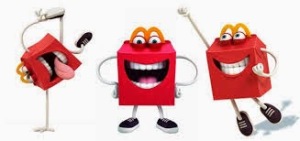McDonald’s is desperately looking to change the image of their food – from unhealthy (and, apparently, unnatural) to something closer to how people see fast-casual restaurants, that have apparently been eating McDonald’s proverbial lunch!
To that end, they’ve hired Grant Imahara, former host of Mythbusters, as part of their new social media campaign. Mr. Imahara is, ostensibly, far less frightening than their previous Facebook and Twitter Happy Meal mascot that ended up drawing massive mockery and scorn from audiences. And, four straight months of declining U.S. same-store sales. To be clear, we don’t believe that the mascot contributed much to that decline. McDonald’s has been suffering from more than just a bad case of social media malaise, although it is worth pointing out that social media is not a universal antidote for what ails them!
In a study conducted 3rd Quarter this year by Brand Keys, Millennials reported a 20% decrease in visits to fast food chains, 13% indicted fast food was “cheap” and “edible” but not much more than that. Fifty-three percent (53%) characterized it as “dollar food,” the result of a habituated reliance of fast food brands like McDonald’s (credited as the originator of the ‘Dollar Menu’) to boost sales. But apparently not working as well as in years past. Baby Boomers indicated an 18% drop in fast food restaurant visitation, citing that they were looking for “quality food,” and didn’t expect to get it at places like McDonalds. Gen Xers reported an 11% decrease in visitation. They wanted their food fast, but even that’s something McDonald’s has been reported struggling with.
To dispel all these beliefs – and hopefully shift consumer behavior – McDonald’s is turning to social media to take real questions from consumers and deliver real answers. Answers to questions like, “What is mechanically-separated meat, and how do you turn it into a nugget?” or “What’s with that pink slime?” or “Why are there 17 ingredients in your French fries?” “Is there horsemeat in your hamburgers?” and the very, very, best of all: “Does McDonald’s even sell real food?” Don’t believe us? Check it out here: www.youtube.com/watch?v=UaJUq1ncCRo
The company – apparently unaware of Albert Einstein’s definition of “insanity,” i.e., doing the same thing again and again expecting different results, has been rolling out new menu items and price promotions, including a $5 20-pack McNuggets, $2 jalapeño burgers, and National free coffee events. Ben Stringfellow, a spokesman for McDonald’s USA, said, “People are looking for faster, more straightforward responses to their questions about our food.” Actually they’re not, Ben. That’s what late-20th century research techniques and the ad agency told you.
What they’re looking for is quality food (quality, which by the way, it turns out they’re willing to pay for at fast-casual restaurants), served in a reasonable timeframe. That’s not exactly the secret of the decade. But with consumer decision-making more emotional than rational, Q&A, no matter how many social media platforms are used, isn’t the answer to this problem. A new wrap, a “natural” frappe, or a social media app won’t fix what needs fixing. It’s the brand. And it needs reinvention.
That and what the brand stands for à la emotional engagement. Where emotional engagement with a brand is high (and BTW, you can’t buy that for a dollar), consumers are six times more likely to trust you. When they do, they don’t ask questions like “Are your ingredients pure?” or “Is it actually meat?” They walk into your restaurants already believing all that! And more. Which is precisely why Chipotle Mexican Grill reported same-store sales growth of 17.3%.
It seems as if the research McDonald’s is relying on is the kind of stale Q&A that stopped providing attitudinal and behavioral insights around 1995. Maybe earlier than that. There may not be such a thing as a free lunch, but here’s a free tip: It’s the brand, not the food. You’d think a company as big as McDonald’s, with all their marketing and insight resources, would have figured out that recipe by now!
Find out more about what makes customer loyalty happen and how Brand Keys metrics is able to predict future consumer behavior: brandkeys.com. Visit our YouTube channel to learn more about Brand Keys methodology, applications and case studies.
Share this:
